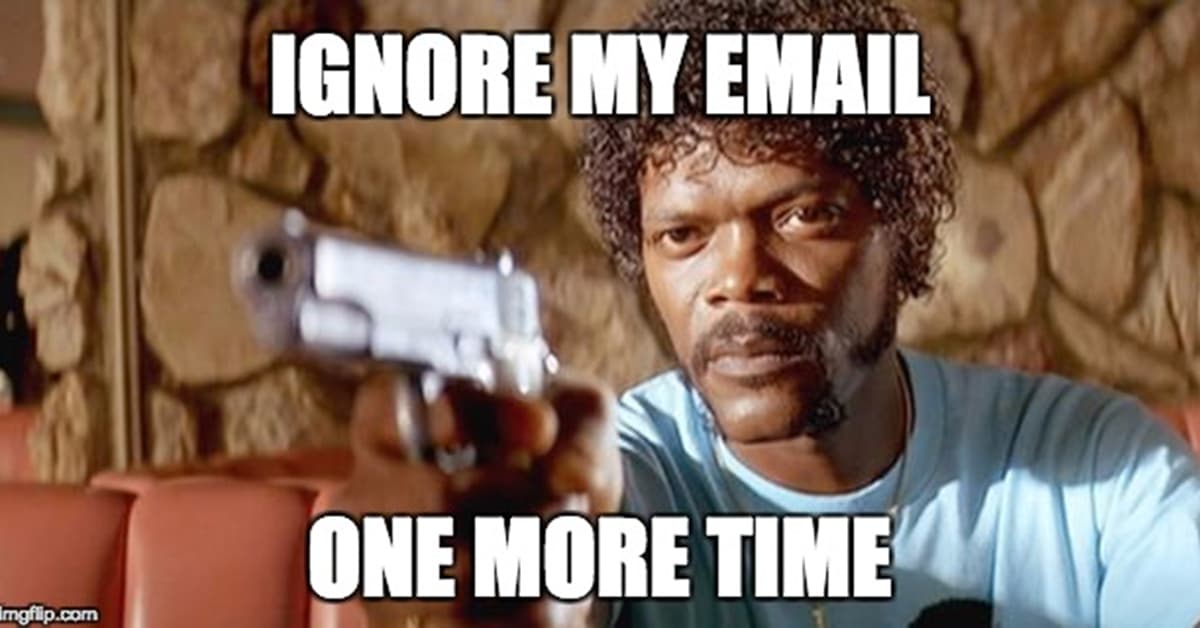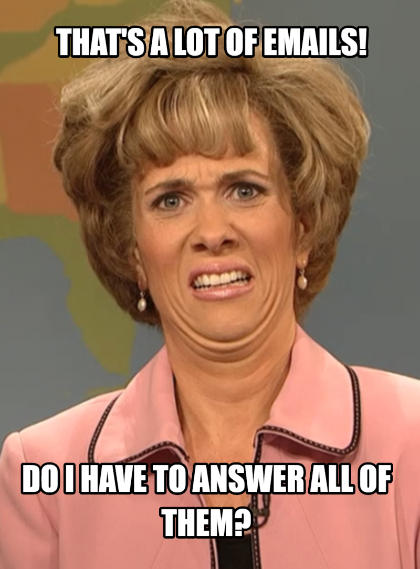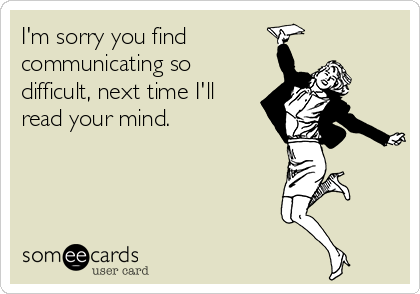I recently dropped a line to an entrepreneur acquaintance of mine. We hadn’t spoken in a while, and I wanted to invite him onto the show for an interview.
A few seconds later, a response appeared in my inbox.
“Nobody ever changed the world answering emails. Because I’m trying to reduce my inputs and spend more time on meaningful work, shipping important features, and managing the growth of our business, I’m dramatically reducing the time I spend on email.”
The autoresponder went on to explain a “better” way to get in touch with him, which involved a contact form with a drop-down list of topics, like an Amazon customer service request.
A little annoyed, but willing to play along, I gave it a shot. After several follow-ups, I never got a response — despite the fact that the podcast would have been huge for him and his company. I guess my offer wasn’t “meaningful” or “important” enough to entertain. It definitely didn’t contribute to “changing the world.” Which, you know, is unlikely if you never actually reply.
This whole exchange (or rather, the lack of it) got me thinking about how people treat their inboxes these days.
We’re living in a time where productivity is king, where “adding value,” “prioritizing,” and “automating” are virtues we’re told to aspire to. Email, which is high-touch and admittedly time-consuming, is the first thing that gets neglected. In fact, it’s actually become a badge of honor to brag how “crazy” your inbox is.
After all, why spend hours each week typing out responses to dozens of people when you could be debugging/writing/selling/[insert more valuable activity here]? Why be a good communicator when you’re too busy/important/swamped/[insert other desirable quality here]? In a world of limited resources, isn’t email just a colossal waste of time and energy?
Well, sure — if you believe that your inbox is just an incidental part of your life and career. But the reality is that your inbox isn’t just a nuisance or a nice-to-have. In many ways, it is your life. It is your career. In the same way that your physical voice is an essential part of how you show up in the world, your inbox is an essential part of how you relate to other people. You can pretend it doesn’t matter all you want, but the fact remains that email is a crucial — and powerful — aspect of our lives.
(And by the way, when I talk about “email” in this article, I mean whatever your primary mode of communication is. For most of us, that’s the inbox. But it could also be Slack, Teams, text messages, social DMs, the telephone, or whatever other tool you use to meaningfully communicate with people. I’ll keep saying “email,” but know that everything I’m saying applies to any form of communication that ties you to the people in your life.
What I’m not talking about here is checking your social media compulsively. Your Twitter DMs could be an alternative to the traditional inbox, sure. But posting photos, liking comments, and commenting on posts are a different class of communication. They’re not generally essential, and they don’t play the same pivotal role in your life that email does.)
Because here’s the truth about people who don’t communicate well: They’re not too busy to respond. They just don’t care enough to respond.
Poor communicators think that they don’t communicate well because they have more important things to do. This is how they justify their poor communication to themselves and to others. But what they’re really saying is that they don’t consider communication all that important. They don’t understand (or simply refuse to recognize) how critical their relationships really are, and they’re too disorganized to develop tiny systems and habits to maintain them. They’d like us to think that they’re cleverly diverting their time and attention to more important tasks. But in reality, they haven’t figured out the discipline to handle something so crucial — because they don’t realize how crucial it actually is.
Which, in most cases, also means they’re probably not very good at their jobs. But I’ll get to that in a second. First, we have to talk about why your inbox matters so much.
Good communication is a reflection of who you are.
At a minimum, staying on top of your inbox capitalizes on all the work you normally do in your job. It allows you to present that work in the best possible way to your colleagues, helps you facilitate all the conversations you need to have around it, and makes you a pleasant and productive person to deal with. I think we can all agree that that’s really just table stakes in this day and age.
But email is also so much more than that. It’s how you show up in the digital world. It’s how you create and build relationships. It’s how you make yourself available to the people in your life.
You can tell a lot about someone from the way they communicate. You can tell if they’re open, kind, genuine, helpful, or productive. You can also tell if they’re messy, vague, self-interested, difficult or dismissive. Even the fact that someone responds to you — and how quickly they respond — says a great deal about them. (Think about my acquaintance with the autoresponder.) Our communications are proxies for our personalities, like little digital ambassadors representing us wherever they go.
So when you ignore an email, you’re not just dodging an obligation. You’re also communicating (intentionally or not) what kind of person you are, how you treat people, and what you care about.
As Adam Grant once pointed out, ignoring someone’s email is no different from ignoring them in the hallway at work. You’d never avoid eye contact and walk away from a colleague in real life because you were “too busy.” You’d never ignore someone who waved to you in the morning because you were “swamped.” So why do we do it in our inboxes? Grant calls this “digital snubbery,” and he’s absolutely right.
Being responsive to others by email is extending the same basic courtesy you’d extend in real life. When you do, you signal that you’re the kind of person who takes people seriously, treats them respectfully, and values their desire to connect. You’re saying as much about yourself as you are about them.
But this kind of responsiveness is not just for people who want to have unusually killer networks. It’s important for everyone, in every field, at every stage of life who wants to be connected to other people.
Good communication is what creates good relationships.
People who think that email is extraneous to their lives are missing something huge. Every single role in this world requires far more thoughtfulness, conscientiousness, and attention than people like to think. It doesn’t matter if you’re a scientist peering into a microscope alone for hours on end, a wedding planner managing dozens of people, or a parent coordinating schedules and homework and plans for the whole family. If you’re a human being interacting with other human beings in this world, then being a great communicator is non-negotiable.
Every single role in this world depends in some way on relationships. And good communication is the lifeblood of good relationships.
Whenever I meet someone who tells me they’re “just not great at email,” I usually ask how things are going for them. Do they feel empowered and connected? Are they advancing in their careers? Are they encountering new ideas, opportunities, and experiences?
Without fail, the answer is always some version of “not really.” Their lives are stagnant because their relationships are weak, and their relationships are weak because their communication is poor. After hundreds of these conversations, I’m convinced there’s a correlation between the number of unread emails in someone’s inbox and their degree of dissatisfaction in life. That’s not to say that answering email alone will make you fulfilled (it won’t). But it is to say that being in touch with people who matter will create more opportunities for that fulfillment to take place.
Interestingly, a lot of people who think that good communication is just a bonus are extremely capable in their jobs. The problem is, they’re narrowly capable. They’re often in highly specialized roles (a special-needs teacher, a deep-sea diver, a Python programmer), where they’re rewarded primarily for their technical ability (how well can you teach, how quickly can you repair, how well can you code). They often work with and for other people who share that bias. That then reinforces the belief that all they really need to be successful is to be excellent at what they do. And for a while, that seems to be true.
But at some point, they invariably realize that something is holding them back. They stop getting promoted. They plateau in their earning power. They see other people getting ahead, sometimes at their expense. After 10 or 15 years of ignoring their inboxes, they find themselves working for the person they hired four years ago, or suddenly out of a job when their company downsizes. They realize that they’re falling behind despite their abilities.
If they’re lucky, these people realize that they’re falling behind because they don’t take their relationships seriously. They thought (or maybe just wanted to believe) that it was enough to be good, when in reality they need to be good in relationship with other people. And being in relationship with other people depends on being in touch, and being in touch means being responsive by email.
This is why I spend hours every week responding to email. To me, it’s never a waste of time engaging with a listener’s question, introducing people in my network, providing a friend some expertise, or just catching up with someone I haven’t talked to in a while. I consider this my job — not just as a podcaster and journalist, but as a human being.
Why? Because my inbox is my main portal to other people. I don’t view it as a place where other people make inconvenient demands of me. I view it as an opportunity to help them achieve their goals, whatever they might be, and for me to achieve mine.
As Adam Grant put it, “[The notion of] ‘My inbox is other people’s priorities’ bothers me … Your priorities should include other people and their priorities. It’s common courtesy to engage with people who are thoughtful in reaching out.”
I would go a step further: It’s not just common courtesy, but enlightened relationship-building.
People who communicate well take other people seriously. They know that every exchange is another data point in someone’s impression of them, another potential investment in the relationship at hand. They know that if they ignore a question, dodge a request, or shrug off a connection, they’re hurting their social capital. If they reply, engage, and invest, then they’re deepening their relationships. It’s really as simple as that.
When you realize that, it’s a lot harder to justify neglecting your inbox. But if that weren’t reason enough, being on top of your email is also non-negotiable in an even more basic way.
Email is an essential skill.
A lot of people think of email as an unfortunate byproduct of modern life. I think that’s why people (especially in Silicon Valley) spend so much time trying to kill it — because they don’t appreciate that the communication it enables is so important.
But email isn’t just a necessary evil, like commuting to work or attending pointless meetings. (Both of which have fallen away in the pandemic, while the inbox has remained and even flourished.) Email is actually an essential tool. You can’t ignore it any more than you can ignore Microsoft Office or Google Calendar. It’s a core part of how we operate.
After all, you’d never say “I’m not really an Excel person” if you worked in finance, or “I’m not really a phone person” if you worked in customer service. You’d be laughed out of the building, and rightfully so. But people are proud to tell you that they have 17,000 unread emails in their inbox, as if their inability to deal with this essential tool is a sign of their effectiveness. It’s sadly hilarious when you really stop to think about it.
Now, we can debate whether email really is the most effective tool for everyday communication. But whether that communication moves to Slack or company IMs or Zoom or good old fashioned text messaging, we still have to deal with it. And the fact remains that the inbox is still the dominant form of communication for most people.
So to ignore your email because you think you have something better to do is to ignore the way that most of the world operates. You can’t reasonably neglect your inbox any more than you can reasonably neglect text messages, your phone, or your internet browser. What would happen if we treated the inbox as one of these essential tools? Would we finally see that our excuses for ignoring it are pretty lame?
If we did, we’d realize what top performers in every field have known all along.
The most successful people in the world are incredible at email.
As the host of a show who interviews hundreds of people a year and manages dozens of programs and products, I interact with loads of people every day. One of the most striking things I’ve noticed is that the most successful people I meet are generally amazing at email, while the ones who struggle are generally pretty bad at it.
There’s a reason that you can reach people like Mark Cuban or Ray Dalio or Adam Grant pretty easily, and often receive a reply the very same day. Kobe Bryant, for example, was remarkably easy to book on the show, while Malcolm Gladwell tended to respond to emails within 48 hours. Meanwhile, an obscure academic who sold a couple thousand copies of his book and is about to get axed by his publisher will take 14 emails and nine tweets in order to respond.
This is not an accident. As I’ve said, it’s the people who take their communication seriously that present their best work, build great relationships, and create opportunities for themselves.
(And yes, my network plays a huge role here, of course. These people obviously aren’t replying to every single email from every single person that quickly. But that just proves my point: the quality of your relationships determines how other people engage with you. And most of that relationship-building takes place by — you guessed it — email.)
High performers tend to be conscientious communicators. Or, to put it more accurately, conscientious communicators tend to become high performers.
Why? Because you actually have to be present, empathetic, and invested in other people’s lives in order to rise to the top of your field. People who are “too busy” to help others or “too important” to respond to inquiries are usually not the kind of people who excel. Even if they’re technically great at what they do, they’re not sharing the fruits of that greatness with other people, advancing other people’s interests in addition to their own, or investing in the people and ideas and opportunities that expand their influence and wealth.
And sure, many successful people have assistants who help scale their communication, which is one big advantage most of us don’t have. It’s easier to stay on top of your inbox when you can afford to outsource it. But they still have to tell those assistants to stay on top of their emails. They still have to train them in the kind of communication that builds their reputations and honors their brands. They’re making a commitment to relationship-building that is available to all of us, irrespective of how rich or famous we are.
Which tells us a lot about the qualities and commitments that lead to success. I’ve never dealt with a top performer who wasn’t a great communicator in some form. And they didn’t become that way after they got successful. They were that way from the start.
Just hit reply.
We need a new agreement around email.
We need to recognize that our inboxes are not an annoying burden we have to manage, but an opportunity to connect with the people in our lives. We need to admit that ignoring our inboxes isn’t a sign of our importance, but of our ignorance. We need to recommit to being responsive, to being available, to being respectful. We need to hit reply more and “mark as unread” less.
Yes, there are dumb emails, distracting emails, junk emails. There are emails that say nothing and there are emails that say too much. There are emails that create work and emails that make things worse. It’s not a perfect medium. Like any medium, its quality really depends on how we use it. But that’s exactly my point. How we do email — how we choose to relate to one another — determines the ROI we get from our inboxes.
Does this mean that we need to reply to every single email? Does this mean that we owe a reply to anyone who pops up in our inbox? Does this mean that we need to be on email 24/7?
Of course not. We still have to be disciplined, reasonable, and practical. A total stranger asking for an introduction to someone in your network doesn’t automatically deserve that favor, and they definitely don’t take priority over the people you already know. An internet troll writing you a takedown email doesn’t deserve a thoughtful reply, certainly not before you engage with your supporters. And you don’t need to stay up late responding to every request just because someone felt compelled to write you. We still need boundaries around email, just as we need boundaries in any relationship.
What I am saying, though, is that we need to be more responsive to the people who actually do matter. And, in many cases, to the people we assume don’t matter. A lot of folks who write me are surprised when I write back explaining why I can’t make a certain introduction for them or jump on the phone to let them “pick my brain.” I’m declining their request, but I’m letting them know. In many cases, this has the interesting effect of actually building the relationship. I’ve shown them the courtesy of responding instead of ignoring them, and they tend to appreciate that honesty. Sometimes, these relationships actually end up developing to the point where I feel comfortable making that introduction or jumping on the phone down the road. I think that’s a healthy balance between committing to communication and maintaining appropriate boundaries.
It’s time to put this whole “too busy for email” myth to bed. It’s time to confront our thin excuses for being hard to reach, and replace them with a simple commitment to being generally responsive. Email isn’t going anywhere. We need each other now more than ever. Neglecting our inboxes isn’t just diverting attention to things that “really matter,” but ignoring something else that is equally important: our relationships. Our inboxes are the space where those relationships begin, develop, and evolve. Isn’t it time to start taking that space seriously again?
[Featured photo by Peterlocicero]









